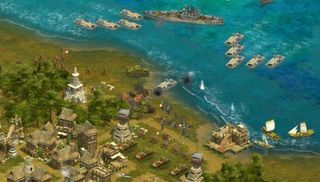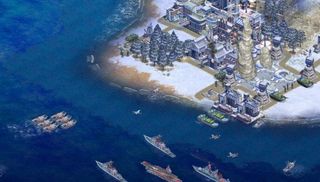Reinstall: Rise of Nations

That's another similarity with Civilization: cities can't be destroyed. Instead, once they run out of hitpoints, they're 'reduced' and can be captured with infantry. After a short period of cultural assimilation, that city then belongs to the capturer, extending their borders and allowing them to use any non- military buildings that belong to it.
"If the armageddon counter reaches a certain point, everyone loses."
This promotes intricate siege tactics. Catapults are crucial to taking cities, but they're very vulnerable to cavalry, so you'll want to guard them with infantry. Those infantry are weak vs archers, which are in turn weak vs cavalry, so you end up with fascinating battles of push and counter-push with different unit types – closer to the Total War series than the usual strategy game approach of 'select all units and click on the enemy base'. Manoeuvring your units so that your scissors can snip through their paper and avoid their rock is nerve-wracking, especially when you're trying to keep your units next to your supply wagons so they don't take attrition damage from being in enemy territory. Meanwhile, generals ride through the ranks giving speed boosts, creating decoys and allowing troops to dig in so they take reduced damage.
That's just in the beginning stages of the game. Later on, gunpowder changes everything, then airbases change everything again, and by the end of the game you've got nuclear weapons to contend with too – which pose an incredibly interesting dilemma. Every time you fire one, you add to the armageddon counter. If that counter reaches a certain point, everyone loses. It's great having a 'nuclear deterrent' on hand, but this neat mechanic makes you think twice about using it until you absolutely need it the most.

It's the combination of these simple yet elegant mechanics that makes Rise of Nations one of the most entertaining strategy games around. It blends elements of the various giants of the genre together, standing on their shoulders to become more than the sum of its parts. Big Huge Games, the developers behind Rise of Nations and its fantasy-oriented sequel Rise of Legends, were acquired in 2008 by THQ, who then sold it to 38 Studios, which went bankrupt in 2012. Such is life.
The intellectual property that belonged to 38 Studios is now owned by the taxpayers of Rhode Island, where the studio was homed, making the chances of a sequel slim. But hey, we got System Shock 2 back from the dead. Perhaps one day Rise of Nations could be rescued too.
PC Gamer Newsletter
Sign up to get the best content of the week, and great gaming deals, as picked by the editors.

Boasting economist lobstermen, gas mask aliens with 120 sexes, and the best space dogfights 2003 has to offer, Underspace is a sci-fi RPG well worth your time

Paradox apologizes for latest Cities: Skylines 2 boondoggle, will give refunds for the Beach Properties DLC: '[We] hope we can regain your trust going forward'
Most Popular


